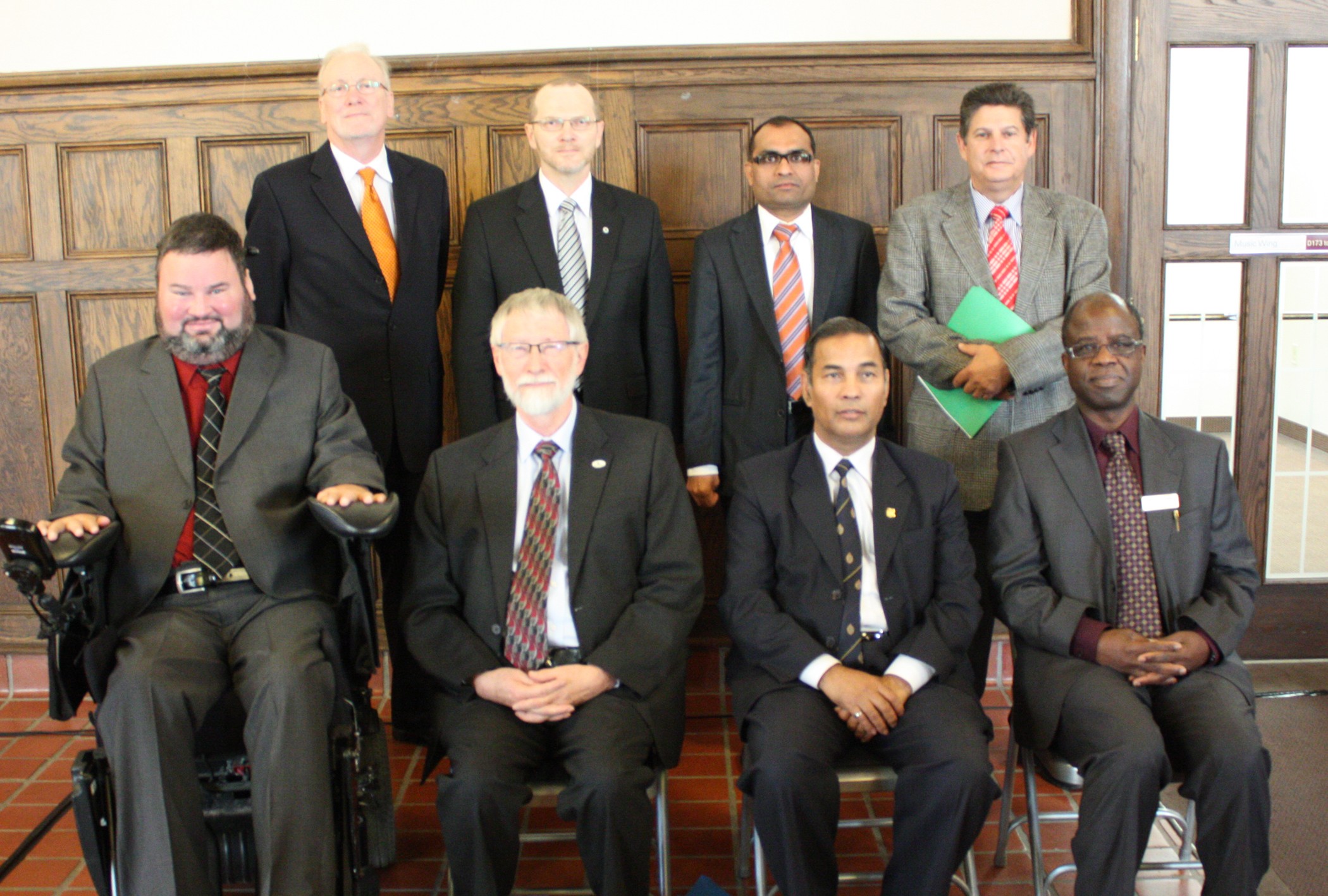October 13, 2011 – Manitoba Universities and Project Partners Awarded $6.4-Million from Canadian International Food Security Research Fund for International Research…Principal Investigators include Professors Kirit Patel, Canadian MennoniteUniversity, and Wolé Akinremi, University of Manitoba…
The Honourable Steven Fletcher, Minister of State (Transport) and Member of Parliament for Charleswood – St. James–Assiniboia, today congratulated recipients on the funding of $6.4-million in awards from the Canadian International Development Agency (CIDA) and Canada’s International Development Research Centre (IDRC), for projects supported through the Canadian International Food Security Research Fund (CIFSRF).
In his remarks earlier this morning, Minister Fletcher said: “I am pleased to be here today to recognize two cutting-edge agricultural research projects that support two leading Canadian universities – the University of Manitoba and the Canadian Mennonite University and their university research partners. These universities will work to find practical solutions to help developing countries become more food self-sufficient. I am convinced that positive results will come out of this research and that it will contribute towards breaking the circle of poverty in developing countries.”
The research project “Revalorizing minor millets in rain-fed regions of South Asia” was awarded $3.5-million, shared among researchers from Canadian Mennonite University and other Canadian and international university and NGO partners. CMU’s Dr. Kirit Patel is one of the principal investigators. Patel is a professor of CMU’s Menno Simons College. Other principal investigators are: Muniappan Karthikeyan, Development of Humane Action Foundation (India); Ram Bahadur Rana, Local Initiatives for Biodiversity, Research and Development, (Nepal); and Widanelage Sathis Pemruwan de Mel, Arthacharya Foundation (Sri Lanka). Dr. Derek Johnson of the University of Manitoba and Dr Shailesh Shukla of The University of Winnipeg are contributing investigators on the project.
The research project “Better vegetable growing opportunities for Nigerian women” was awarded $2.9-million, shared among researchers from the University of Manitoba and other Canadian and international university partners. The University of Manitoba’s Dr. Wolé Akinremi is one of the principal investigators. Other principal investigators are: Cape Breton University’s Dr. Thomas Bouman; Dr. Joseph Oyedele; Obafemi Awolowo University, Nigeria; and Dr. Clement Adebooye, Osun State University, Nigeria.
“We are extremely proud of the success of Professor Patel and his team in securing this significant level of funding,” says Canadian Mennonite University President Gerald Gerbrandt. “Professor Patel is passionate about his work in sustainable food production and international food security. This funding will enable the research team to make significant progress in gaining understanding and knowledge in their field of research, and will enable then to make a valuable contribution in developing practical applications in the future.”
“I congratulate Dr. Akinremi and his co-investigators in Canada and Nigeria on their success in receiving this funding award,” says University of Manitoba Vice-President (Research and International) Digvir Jayas. “The truly collaborative nature of this team of researchers will undoubtedly have an impact on the important issues facing the world today: safe and secure food supplies delivered in a sustainable and economically beneficial model.”
CIFSRF
The Canadian International Food Security Research Fund (CIFSRF) is a key element of CIDA’s Food Security Strategy. This strategy is designed to empower the poorest and most disadvantaged by reducing their vulnerability to various factors that impact their food security —including food shortages, market barriers, and constraints to agricultural productivity. The Food Security Strategy builds on Prime Minister Harper’s 2009 G-8 Summit announcement made in L’Aquila, Italy, that Canada would more than double its investment in sustainable agricultural development with an additional $600 million in funding over three years. Canada is the first G-8 nation to have fully delivered on its L’Aquila commitments.
Thirteen research teams involving Canadian researchers and international partners are recipients of grants provided through CIFSRF. These 13 grants represent two of three calls in the five-year, CA$62-million fund. Results of the third call will be announced in 2012.
The International Development Research Centre (IDRC) and Canadian International Development Agency (CIDA) work in partnership to fund the CIFSRF awards. Refer to news release May 3, 2001: http://publicwebsite.idrc.ca/EN/Programs/Agriculture_and_the_Envirnonment/Canadian_International_Food_Security_Research_Fund/Pages/NewsDetails.aspx?NewsID=288
IDRC
A key part of Canada’s aid program since 1970, the International Development Research Centre (IDRC) supports research in developing countries to promote growth and development. IDRC also encourages sharing this knowledge with policymakers, other researchers, and communities around the world. The result is innovative, lasting local solutions that aim to bring choice and change to those who need it most.
UNIVERSITY OF MANITOBA
The University of Manitoba is the only medical-doctoral post-secondary institution in the province and educates the majority of professionals in Manitoba. The U of M is a world leader in many research areas, including the search for a vaccine against the spread of HIV/AIDS. umanitoba.ca
CANADIAN MENNONITE UNIVERSITY
CMU is a Christian university offering undergraduate degrees in a variety of programs as well as two graduate degree programs. CMU has over 1,700 students at its Shaftesbury campus, Menno Simons College campus, and in the Outtatown program. A College of CMU, Menno Simons is affiliated with The University of Winnipeg. CMU is a member of the Association of Universities and Colleges of Canada (AUCC). www.cmu.ca
IDRC/CIDA GRANTS
CMU’s Menno Simons College Professor Kirit Patel is one of the principal investigators for the $3.5-million project, “Increasing millet production in South Asia.” Other principal investigators of the team are: Muniappan Karthikeyan, Development of Humane Action Foundation, India; Ram Bahadur Rana, Local Initiatives for Biodiversity Research and Development, Nepal; Wideanelage Sathis Pemruwan de Mel, Arthacharya Foundation, Sri Lanka. Dr. Derek Johnson of the University of Manitoba and Dr. Shailesh Shukla of The University of Winnipeg are contributing investigators on the project.
Project #106506: Increasing millet production in South Asia
“Despite the nutritional benefits, tolerance for difficult growing conditions, and ease of storage, minor millets have been neglected by government agricultural policy in South Asia, which has put the emphasis on cash crops and cereals like rice and wheat. Minor millets have long been an important and nutritious part of the diets of small-scale farmers and indigenous groups in the area. Research is needed to help revitalize the development of improved millet species among small-scale farmers and indigenous groups in South Asia.” IDRC website
University of Manitoba’s Dr. Wolé Akinremi is one of the principal investigators for the $2.9-million project, “Better vegetable growing opportunities for Nigerian women.” Other principal investigators are: Cape Breton University’s Dr. Thomas Bouman; Dr. Joseph Oyedele, Obafemi Awolowo University, Nigeria; and Dr. Clement Adebooye, Osun State University, Nigeria.
Project #106511: Better vegetable growing opportunities for Nigerian women
“Growing and gathering vegetables is an extremely important livelihood activity for women in rural Nigeria, who make up a majority of the rural labour force. Vegetables are major foodstuffs for poor rural women and their families, as they often cannot afford staples such as milk, eggs, and meat. New technologies and approaches must be developed to improve farming practices. Doing so will increase the range of commercially viable vegetable varieties that are grown, and will improve nutrition, income, and food security for Nigeria’s rural poor.” IDRC website



